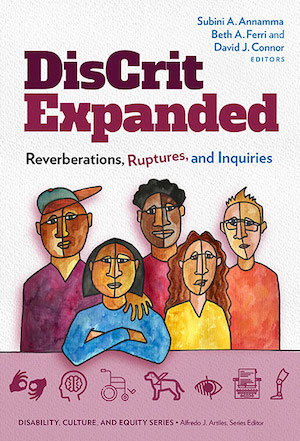Beth Ferri, Associate Dean for Research and Professor of Inclusive Education and Disability Studies, has published a follow-up to DisCrit: Disability Studies and Critical Race Theory in Education (2016).
 Edited with Professor Subini A. Annamma of Stanford University and Emeritus Professor David J. Connor of CUNY-Hunter College, DisCrit Expanded: Reverberations, Ruptures, and Inquiries (Teachers College Press, 2022) explores how disability studies and critical race theory (DisCrit) has both deepened and expanded, providing increasingly nuanced understandings about how racism and ableism circulate across geographic borders, academic disciplines, multiplicative identities, intersecting oppressions, and individual and cultural resistances.
Edited with Professor Subini A. Annamma of Stanford University and Emeritus Professor David J. Connor of CUNY-Hunter College, DisCrit Expanded: Reverberations, Ruptures, and Inquiries (Teachers College Press, 2022) explores how disability studies and critical race theory (DisCrit) has both deepened and expanded, providing increasingly nuanced understandings about how racism and ableism circulate across geographic borders, academic disciplines, multiplicative identities, intersecting oppressions, and individual and cultural resistances.
Including a foreword by DisCrit intellectual forerunner Alfredo J. Artiles, Annamma, Ferri, and Connor convene a diverse group of authors engage in inward, outward, and margin-to-margin analyses that raise deep and enduring questions about how scholars and teachers account for and counteract the collusive nature of oppressions faced by minoritized individuals with disabilities, particularly in educational contexts.
 Contributors ask readers to consider questions such as:
Contributors ask readers to consider questions such as:
- What are the affordances and constraints of DisCrit as it travels outside of US contexts?
- How can DisCrit, as a critical and intersectional framework, be used to support and extend diverse forms of activism, expanded solidarities, and collective resistance?
- How can DisCrit inform and be augmented by engagements with other critical theories and modes of inquiry?
- How can DisCrit help to illuminate agency and resistance among learners with complex learning needs?
- How might DisCrit inform legal studies and other disciplinary and interdisciplinary contexts?
- How can DisCrit be a critical friend to interrogations involving issues of citizenship, language, and more?
Reviewing the book, Professor Zeus Leonardo of the University of California-Berkeley writes, “In this expanded version of DisCrit, editors Annamma, Ferri, Connor, and their contributing authors, convince us that the concept of ability makes possible a unifying grand theory of social relations and the potential for transformative change across race, gender, and culture. Anyone interested in education for critical consciousness would benefit from this update of a perspective that is clearly impacting how educators think about normalcy, intelligence, and special education.”
